Billy Wilder (1906-2002) was an American filmmaker of Jewish descent. He was a multiple Oscar winner and is considered one of the most important directors in American film history. His oeuvre comprises more than 60 films made over a period of over 50 years. He was nominated for an Oscar 21 times as a writer, producer and director and won six awards. At the 1961 Oscars, he won three awards as producer, screenwriter and director for the film The Apartment, a feat that has only been achieved by a total of nine directors to date.
Image may be NSFW.
Clik here to view.
Austrian postcard by Mandelbaum / Österreichische Exilbibliothek im Literaturhaus, Wien/ Photo: Allisa Dauer. Caption: Billy Wilder, born in 1906 in Sucha, Galicia, director and screenwriter.
Image may be NSFW.
Clik here to view.
French postcard by Editions P.I., offered by Victoria S.A. (Biscuits, Chocolates and Patisserie), Brussels. Photo: Paramount Pictures 1950. Barbara Stanwyck in Double Indemnity (Billy Wilder, 1944).
Image may be NSFW.
Clik here to view.
Dutch postcard by Takken, Utrecht, no. 1530. Photo: Paramount. Audrey Hepburn in for Sabrina (Billy Wilder, 1954). Costume: Hubert de Givenchy.
Image may be NSFW.
Clik here to view.
American postcard by Classico San Francisco, no. 105/001. Photo: Twentieth Century Fox / Charles K. Feldman Group Productions. Victor Moore and Marilyn Monroe in The Seven Year Itch (Billy Wilder, 1955).
Image may be NSFW.
Clik here to view.
Czech postcard by Pressfoto, Praha (Prague). Photo: Jack Lemmon and Tony Curtis in Some Like it Hot (Billy Wilder, 1959). Collection: Carla Bosch.
Samuel 'Billie' Wilder was born in 1906 in Sucha, Austria-Hungary often referred to as the Austro-Hungarian Empire. Samuel was the son of Jewish parents, Max and Eugenia Wilder. His father ran the "City" hotel in Krakow as well as several railway station restaurants in the area.
His mother always called her son "Billie". Samuel, therefore, called himself Billie Wilder. Later in the USA, he changed the spelling to Billy. In 1916, during the First World War, the family moved to Vienna fearing the approaching Russian army. In the capital, Billie became close friends with the later Hollywood director Fred Zinnemann, and they kept in touch throughout his life.
Wilder began his career as a reporter for the Viennese tabloid Die Stunde (The Hour). When he interviewed the jazz musician Paul Whiteman in 1926, the latter was so enthusiastic about him that he invited him to come with him to Berlin to show him the city. A week later it turned out that Die Stunde was blackmailing Viennese businessmen and celebrities at the time with the threat of publishing unflattering articles about them. The affair became the biggest media scandal of the First Republic in Austria and Wilder decided to stay in Berlin and work for another newspaper, the city's largest tabloid.
There he came in contact with the film industry. German Wikipedia: "when the director of a film company, Maxim Galitzenstein, had to escape in his pants from the neighbour's bedroom to Wilder's room, he couldn't help but buy Wilder's first screenplay." Billie was hired as a ghostwriter for well-known screenwriters such as Robert Liebmann and Franz Schulz. It was an additional source of income alongside his work as a reporter. In 1929, he contributed with Curt Siodmak, Robert Siodmak, Fred Zinnemann and Edgar G. Ulmer to the classic film Menschen am Sonntag/People on Sunday (Robert Siodmak, Edgar G. Ulmer, 1930). The film follows a group of young residents of Berlin on a summer's day during the interwar period. Hailed as a work of genius, it is a pivotal film in the development of German cinema.
Together with Erich Kästner, Billie wrote the screenplay for Emil und die Detektive/Emil and the Detectives (Gerhard Lamprecht, 1931) the first film adaptation of Kästner's novel and generally considered to be the best film version. Wilder realised his Jewish ancestry would cause problems when the National Socialists would seize power. Immediately after Adolf Hitler came to power in 1933, Wilder moved to France. In Paris, Billie earned his living as a ghostwriter for French screenwriters. Here he also directed his first film, the crime drama Mauvaise graine/Bad Seed (Billie Wilder, Alexander Esway, 1934) with Danielle Darrieux.
Image may be NSFW.
Clik here to view.
Dutch postcard by Filmmuseum, Amsterdam. Photo: Filmmuseum. Poster for Menschen am Sonntag/People on Sunday (Robert Siodmak, Edgar G. Ulmer, 1930) for which Billy Wilder contributed to the story.
Image may be NSFW.
Clik here to view.![Fritz Rasp in Emil und die Detektive (1931)]()
German collectors card in the series 'Vom Werden deutscher Filmkunst - Der Tonfilm', album no. 11, picture no. 58, group 44. Photo: Ufa / Ross Verlag. Fritz Rasp in Emil und die Detektive/Emil and the Detectives (Gerhard Lamprecht, 1931).
Image may be NSFW.
Clik here to view.![Greta Garbo in Ninotchka (1939)]()
Italian postcard by B.F.F. Edit. (Casa Editr. Ballerini & Fratini, Firenze), no. 2178. Photo: Metro-Goldwyn-Mayer. Greta Garbo in Ninotchka (Ernst Lubitsch, 1939).
Image may be NSFW.
Clik here to view.![Greta Garbo and Melvyn Douglas in Ninotchka]()
Belgian collectors card by Kwatta, Bois - D'Haine, no. C 181. Photo: MGM. Greta Garbo and Melvyn Douglas in Ninotchka (Ernst Lubitsch, 1939).
Image may be NSFW.
Clik here to view.![Edward G. Robinson in Double Indemnity (1944)]()
French postcard by Edition P.I., Paris, no. 280, 1950. Photo: Paramount. Edward G. Robinson in Double Indemnity (Billy Wilder, 1944).
Image may be NSFW.
Clik here to view.![Ray Milland]()
Dutch postcard by Takken, no. 3446. Photo: Paramount. Ray Milland.
In 1934 Billie Wilder was able to enter the United States, thanks to a visitor's visa granted by Joe May. Although he spoke no English when he arrived in Hollywood, Wilder was a fast learner. Thanks to contacts such as Peter Lorre, with whom he shared an apartment, he was signed by Paramount Pictures in 1936. After his emigration, he became a naturalised American named Billy.
His partnership with author Charles Brackett started in 1938 and the team was responsible for writing some of Hollywood's classic comedies, including Ninotchka (Ernst Lubitsch, 1939) starring Greta Garbo and Ball of Fire (Howard Hawks, 1941) with Barbara Stanwyck and Gary Cooper.
However, Wilder was dissatisfied with the constant changes to his scripts and wanted to take the reins himself. His partnership with Brackett expanded into a producer-director one in 1942. The comedy The Major and the Minor (1942) with Ginger Rogers and Ray Milland was the first film he directed. His second film, Five Graves to Cairo (1943) with Franchot Tone, served as a propaganda film against the Nazi regime during World War II.
Wilder quickly garnered success as a director. He had his breakthrough with the Film Noir Double Indemnity (1944), starring Fred MacMurray, Edward G. Robinson and Barbara Stanwyck as a femme fatale. The film received seven Oscar nominations, including two for Wilder in the categories of Best Director and Best Adapted Screenplay.
In 1945, Wilder was commissioned by the U.S. Army Signal Corps to condense the extensive material available from the American and British military about, among other things, the liberation of the Bergen-Belsen concentration camp into a short film, Death Mills/Die Todesmühlen (1945). The film was intended for German audiences to educate them about the atrocities committed by the Nazi regime. It became the only documentary film under his supervision. Not having seen his mother and stepfather since he went to Berlin in 1933 to make films, he joined American patrols through war-torn Europe during WWII. Through intense research, he learned they had been murdered in concentration camps and his grandmother had died in a Polish ghetto. Later, he usually declined to discuss this.
Image may be NSFW.
Clik here to view.![Jean Arthur, John Lund and Marlene Dietrich, A Foreign Affair (1948)]()
Belgian press photo by BRT Television. Jean Arthur, John Lund and Marlene Dietrich in A Foreign Affair (Billy Wilder, 1948).
Image may be NSFW.
Clik here to view.![Audrey Hepburn in Sabrina (1954)]()
French postcard by Editions du Globe, Paris, no. 384. Photo: Paramount / PPC, 1955. Audrey Hepburn in Sabrina (Billy Wilder, 1954). Costume: Hubert de Givenchy.
Image may be NSFW.
Clik here to view.![Audrey Hepburn]()
French postcard. Audrey Hepburn in Sabrina (Billy Wilder, 1954). Dress: Hubert de Givenchy.
Image may be NSFW.
Clik here to view.![Marilyn Monroe and Tom Ewell in The Seven Year Itch (1955)]()
French postcard, no. A030. Marilyn Monroe and Tom Ewell in The Seven Year Itch (Billy Wilder, 1955).
Image may be NSFW.
Clik here to view.![Marilyn Monroe and Tom Ewell at the set of The Seven Year's Itch (1955)]()
American postcard by Fotofolio, New York, no. MP65. Photo: Elliot Erwitt. Marilyn Monroe and Tom Ewell at the set of The Seven Year Itch (Billy Wilder, 1955).
Image may be NSFW.
Clik here to view.![Marilyn Monroe in The Seven Year Itch (1955)]()
American postcard by Classico San Francisco, no. 105/031. Marilyn Monroe in The Seven Year Itch (Billy Wilder, 1955).
Billy Wilder received his first Oscar for the drama The Lost Weekend (1945), starring Ray Milland as an unsuccessful author with a drinking problem. The film dealt unusually realistically with the problems of an alcoholic.
Shortly afterwards, Wilder went to Germany on behalf of the American government with the rank of colonel and directed the film A Foreign Affair (1948), starring Jean Arthur and Marlene Dietrich, which dealt critically with the Nazi past in occupied Germany.
Among his other classics are the drama Sunset Boulevard (1950) starring William Holden and Gloria Swanson, the romance Sabrina (1954) starring Audrey Hepburn and Humphrey Bogart, and the comedies The Seven Years Itch (1955) and Some Like It Hot (1959), both starring Marilyn Monroe.
He had a long-standing partnership with screenwriter I.A.L. Diamond with whom he made such classic comedies as The Apartment (1961) and Irma La Douce (1963), both with Jack Lemmon and Shirley MacLaine. His work is characterised by cynicism, humour and an original storyline. He was fascinated by a wide variety of subjects and he often used the same actors, such as Jack Lemmon and Walter Matthau.
Wilder's later works were unable to match the success of his heyday. Although he lost some of his brilliance as a filmmaker later in his life, many of his films are still considered classics. From the mid-1980s, he limited himself to consulting work for United Artists. In 2002, Billy Wilder died of pneumonia in Los Angeles, California at the age of 95. He had been struggling with health problems for some time, but still gave interviews. His grave is in Westwood Village Memorial Park Cemetery. Wilder was married to Judith Coppicus-Iribe from 1936 to 1947. They had a daughter together, Victoria (1939). In 1949 Wilder married the actress and singer Audrey Young (1922-2012).
Image may be NSFW.
Clik here to view.![Marlene Dietrich, Charles Laughton and Tyrone Power in Witness for the Prosecution (1957)]()
Dutch postcard by Filmmuseum, Amsterdam. Photo: Filmmuseum. Marlene Dietrich, Charles Laughton and Tyrone Power in Witness for the Prosecution (Billy Wilder, 1957). Caption: "I am constantly surprised that women's hats do not provoke more murders."
Image may be NSFW.
Clik here to view.![Gary Cooper and Lise Bourdin in Love in the Afternoon (1956)]()
French postcard for the exhibition 'Figures de Facteur' (2004-2005) in Paris by Cartapub / Ministerie de la Culture et de la Communication. Photo: Raymond Voinquel. Gary Cooper and Lise Bourdin in Love in the Afternoon (Billy Wilder, 1956).
Image may be NSFW.
Clik here to view.![Marilyn Monroe in Some Like It Hot (1959), Billy Wilder]()
Dutch freecard by Boomerang, Amsterdam. Photo: Filmmuseum. Marilyn Monroe in Some Like It Hot (Billy Wilder, 1959). Caption: Filmmuseum Classics Tour 2002: Some Like It Hot and 26 other unforgettable classics.
Image may be NSFW.
Clik here to view.![Marilyn Monroe in Some Like it Hot (1959)]()
Czech postcard by Pressfoto, Praha (Prague). Photo: Marilyn Monroe in Some Like it Hot (Billy Wilder, 1959). Collection: Carla Bosch.
Image may be NSFW.
Clik here to view.![Jack Lemmon and Joe E. Brown in Some Like it Hot (1959)]()
Czech postcard by Pressfoto, Praha (Prague). Photo: Jack Lemmon and Joe E. Brown in Some Like it Hot (Billy Wilder, 1959). Collection: Carla Bosch.
Image may be NSFW.
Clik here to view.![Jack Lemmon in The Apartment (1960)]()
Dutch postcard by Filmmuseum, Amsterdam. Photo: Filmmuseum. Jack Lemmon in The Apartment (Billy Wilder, 1960).
Image may be NSFW.
Clik here to view.![Jack Lemmon and Judi West in The Fortune Cookie (1966)]()
Big East-German card by VEB Progress Film-Vertrieb, Berlin, no. 65/72,1972. Jack Lemmon and Judi West in The Fortune Cookie (Billy Wilder, 1966).
Sources: Michael Brooke (IMDb), Wikipedia (Dutch and German) and IMDb.
Image may be NSFW.
Clik here to view.
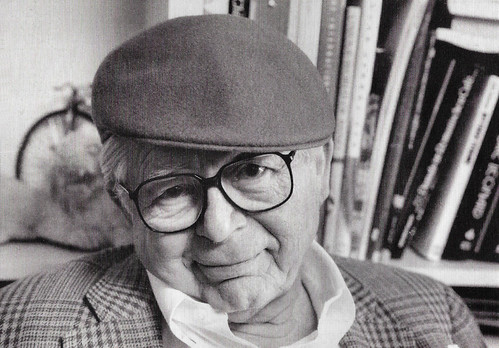
Austrian postcard by Mandelbaum / Österreichische Exilbibliothek im Literaturhaus, Wien/ Photo: Allisa Dauer. Caption: Billy Wilder, born in 1906 in Sucha, Galicia, director and screenwriter.
Image may be NSFW.
Clik here to view.

French postcard by Editions P.I., offered by Victoria S.A. (Biscuits, Chocolates and Patisserie), Brussels. Photo: Paramount Pictures 1950. Barbara Stanwyck in Double Indemnity (Billy Wilder, 1944).
Image may be NSFW.
Clik here to view.
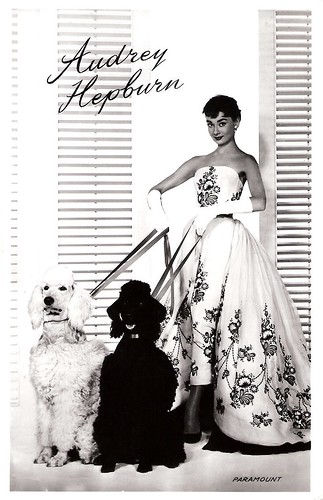
Dutch postcard by Takken, Utrecht, no. 1530. Photo: Paramount. Audrey Hepburn in for Sabrina (Billy Wilder, 1954). Costume: Hubert de Givenchy.
Image may be NSFW.
Clik here to view.
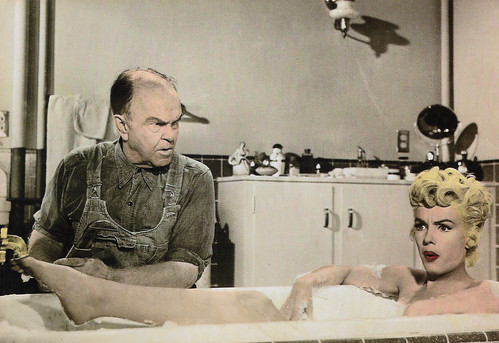
American postcard by Classico San Francisco, no. 105/001. Photo: Twentieth Century Fox / Charles K. Feldman Group Productions. Victor Moore and Marilyn Monroe in The Seven Year Itch (Billy Wilder, 1955).
Image may be NSFW.
Clik here to view.
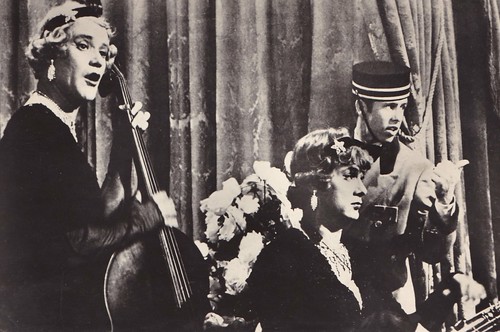
Czech postcard by Pressfoto, Praha (Prague). Photo: Jack Lemmon and Tony Curtis in Some Like it Hot (Billy Wilder, 1959). Collection: Carla Bosch.
The biggest media scandal of the First Republic in Austria
Samuel 'Billie' Wilder was born in 1906 in Sucha, Austria-Hungary often referred to as the Austro-Hungarian Empire. Samuel was the son of Jewish parents, Max and Eugenia Wilder. His father ran the "City" hotel in Krakow as well as several railway station restaurants in the area.
His mother always called her son "Billie". Samuel, therefore, called himself Billie Wilder. Later in the USA, he changed the spelling to Billy. In 1916, during the First World War, the family moved to Vienna fearing the approaching Russian army. In the capital, Billie became close friends with the later Hollywood director Fred Zinnemann, and they kept in touch throughout his life.
Wilder began his career as a reporter for the Viennese tabloid Die Stunde (The Hour). When he interviewed the jazz musician Paul Whiteman in 1926, the latter was so enthusiastic about him that he invited him to come with him to Berlin to show him the city. A week later it turned out that Die Stunde was blackmailing Viennese businessmen and celebrities at the time with the threat of publishing unflattering articles about them. The affair became the biggest media scandal of the First Republic in Austria and Wilder decided to stay in Berlin and work for another newspaper, the city's largest tabloid.
There he came in contact with the film industry. German Wikipedia: "when the director of a film company, Maxim Galitzenstein, had to escape in his pants from the neighbour's bedroom to Wilder's room, he couldn't help but buy Wilder's first screenplay." Billie was hired as a ghostwriter for well-known screenwriters such as Robert Liebmann and Franz Schulz. It was an additional source of income alongside his work as a reporter. In 1929, he contributed with Curt Siodmak, Robert Siodmak, Fred Zinnemann and Edgar G. Ulmer to the classic film Menschen am Sonntag/People on Sunday (Robert Siodmak, Edgar G. Ulmer, 1930). The film follows a group of young residents of Berlin on a summer's day during the interwar period. Hailed as a work of genius, it is a pivotal film in the development of German cinema.
Together with Erich Kästner, Billie wrote the screenplay for Emil und die Detektive/Emil and the Detectives (Gerhard Lamprecht, 1931) the first film adaptation of Kästner's novel and generally considered to be the best film version. Wilder realised his Jewish ancestry would cause problems when the National Socialists would seize power. Immediately after Adolf Hitler came to power in 1933, Wilder moved to France. In Paris, Billie earned his living as a ghostwriter for French screenwriters. Here he also directed his first film, the crime drama Mauvaise graine/Bad Seed (Billie Wilder, Alexander Esway, 1934) with Danielle Darrieux.
Image may be NSFW.
Clik here to view.
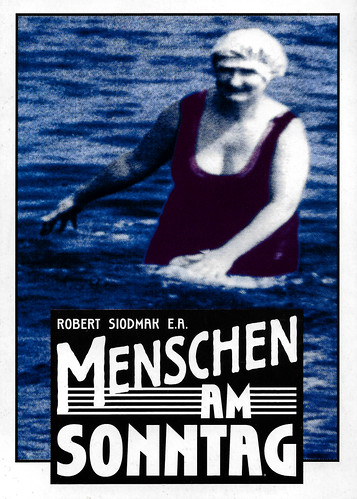
Dutch postcard by Filmmuseum, Amsterdam. Photo: Filmmuseum. Poster for Menschen am Sonntag/People on Sunday (Robert Siodmak, Edgar G. Ulmer, 1930) for which Billy Wilder contributed to the story.
Image may be NSFW.
Clik here to view.
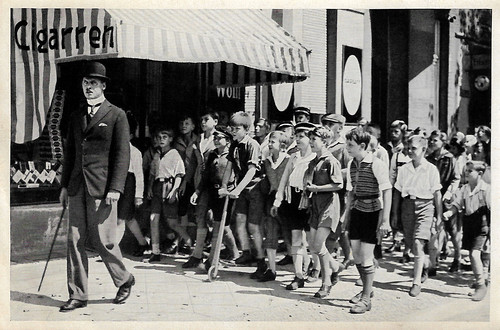
German collectors card in the series 'Vom Werden deutscher Filmkunst - Der Tonfilm', album no. 11, picture no. 58, group 44. Photo: Ufa / Ross Verlag. Fritz Rasp in Emil und die Detektive/Emil and the Detectives (Gerhard Lamprecht, 1931).
Image may be NSFW.
Clik here to view.

Italian postcard by B.F.F. Edit. (Casa Editr. Ballerini & Fratini, Firenze), no. 2178. Photo: Metro-Goldwyn-Mayer. Greta Garbo in Ninotchka (Ernst Lubitsch, 1939).
Image may be NSFW.
Clik here to view.
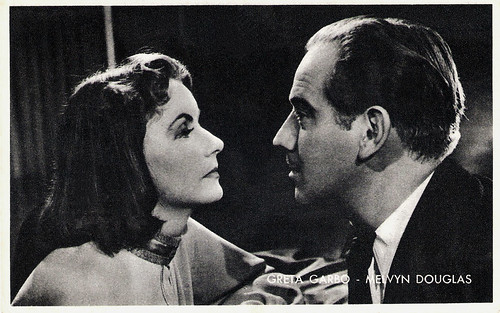
Belgian collectors card by Kwatta, Bois - D'Haine, no. C 181. Photo: MGM. Greta Garbo and Melvyn Douglas in Ninotchka (Ernst Lubitsch, 1939).
Image may be NSFW.
Clik here to view.

French postcard by Edition P.I., Paris, no. 280, 1950. Photo: Paramount. Edward G. Robinson in Double Indemnity (Billy Wilder, 1944).
Image may be NSFW.
Clik here to view.

Dutch postcard by Takken, no. 3446. Photo: Paramount. Ray Milland.
The atrocities committed by the Nazi regime
In 1934 Billie Wilder was able to enter the United States, thanks to a visitor's visa granted by Joe May. Although he spoke no English when he arrived in Hollywood, Wilder was a fast learner. Thanks to contacts such as Peter Lorre, with whom he shared an apartment, he was signed by Paramount Pictures in 1936. After his emigration, he became a naturalised American named Billy.
His partnership with author Charles Brackett started in 1938 and the team was responsible for writing some of Hollywood's classic comedies, including Ninotchka (Ernst Lubitsch, 1939) starring Greta Garbo and Ball of Fire (Howard Hawks, 1941) with Barbara Stanwyck and Gary Cooper.
However, Wilder was dissatisfied with the constant changes to his scripts and wanted to take the reins himself. His partnership with Brackett expanded into a producer-director one in 1942. The comedy The Major and the Minor (1942) with Ginger Rogers and Ray Milland was the first film he directed. His second film, Five Graves to Cairo (1943) with Franchot Tone, served as a propaganda film against the Nazi regime during World War II.
Wilder quickly garnered success as a director. He had his breakthrough with the Film Noir Double Indemnity (1944), starring Fred MacMurray, Edward G. Robinson and Barbara Stanwyck as a femme fatale. The film received seven Oscar nominations, including two for Wilder in the categories of Best Director and Best Adapted Screenplay.
In 1945, Wilder was commissioned by the U.S. Army Signal Corps to condense the extensive material available from the American and British military about, among other things, the liberation of the Bergen-Belsen concentration camp into a short film, Death Mills/Die Todesmühlen (1945). The film was intended for German audiences to educate them about the atrocities committed by the Nazi regime. It became the only documentary film under his supervision. Not having seen his mother and stepfather since he went to Berlin in 1933 to make films, he joined American patrols through war-torn Europe during WWII. Through intense research, he learned they had been murdered in concentration camps and his grandmother had died in a Polish ghetto. Later, he usually declined to discuss this.
Image may be NSFW.
Clik here to view.

Belgian press photo by BRT Television. Jean Arthur, John Lund and Marlene Dietrich in A Foreign Affair (Billy Wilder, 1948).
Image may be NSFW.
Clik here to view.

French postcard by Editions du Globe, Paris, no. 384. Photo: Paramount / PPC, 1955. Audrey Hepburn in Sabrina (Billy Wilder, 1954). Costume: Hubert de Givenchy.
Image may be NSFW.
Clik here to view.

French postcard. Audrey Hepburn in Sabrina (Billy Wilder, 1954). Dress: Hubert de Givenchy.
Image may be NSFW.
Clik here to view.

French postcard, no. A030. Marilyn Monroe and Tom Ewell in The Seven Year Itch (Billy Wilder, 1955).
Image may be NSFW.
Clik here to view.
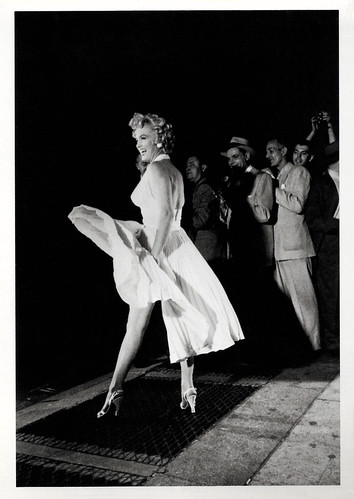
American postcard by Fotofolio, New York, no. MP65. Photo: Elliot Erwitt. Marilyn Monroe and Tom Ewell at the set of The Seven Year Itch (Billy Wilder, 1955).
Image may be NSFW.
Clik here to view.
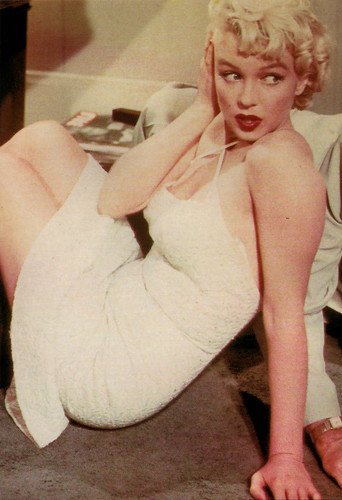
American postcard by Classico San Francisco, no. 105/031. Marilyn Monroe in The Seven Year Itch (Billy Wilder, 1955).
Cynicism, humour and an original storyline
Billy Wilder received his first Oscar for the drama The Lost Weekend (1945), starring Ray Milland as an unsuccessful author with a drinking problem. The film dealt unusually realistically with the problems of an alcoholic.
Shortly afterwards, Wilder went to Germany on behalf of the American government with the rank of colonel and directed the film A Foreign Affair (1948), starring Jean Arthur and Marlene Dietrich, which dealt critically with the Nazi past in occupied Germany.
Among his other classics are the drama Sunset Boulevard (1950) starring William Holden and Gloria Swanson, the romance Sabrina (1954) starring Audrey Hepburn and Humphrey Bogart, and the comedies The Seven Years Itch (1955) and Some Like It Hot (1959), both starring Marilyn Monroe.
He had a long-standing partnership with screenwriter I.A.L. Diamond with whom he made such classic comedies as The Apartment (1961) and Irma La Douce (1963), both with Jack Lemmon and Shirley MacLaine. His work is characterised by cynicism, humour and an original storyline. He was fascinated by a wide variety of subjects and he often used the same actors, such as Jack Lemmon and Walter Matthau.
Wilder's later works were unable to match the success of his heyday. Although he lost some of his brilliance as a filmmaker later in his life, many of his films are still considered classics. From the mid-1980s, he limited himself to consulting work for United Artists. In 2002, Billy Wilder died of pneumonia in Los Angeles, California at the age of 95. He had been struggling with health problems for some time, but still gave interviews. His grave is in Westwood Village Memorial Park Cemetery. Wilder was married to Judith Coppicus-Iribe from 1936 to 1947. They had a daughter together, Victoria (1939). In 1949 Wilder married the actress and singer Audrey Young (1922-2012).
Image may be NSFW.
Clik here to view.
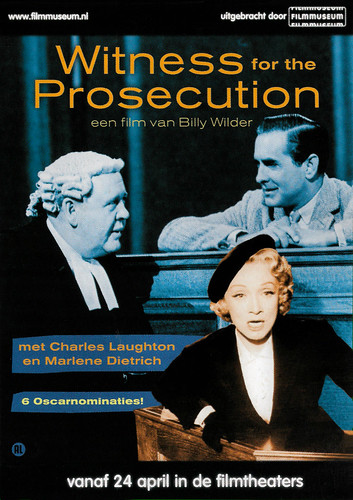
Dutch postcard by Filmmuseum, Amsterdam. Photo: Filmmuseum. Marlene Dietrich, Charles Laughton and Tyrone Power in Witness for the Prosecution (Billy Wilder, 1957). Caption: "I am constantly surprised that women's hats do not provoke more murders."
Image may be NSFW.
Clik here to view.
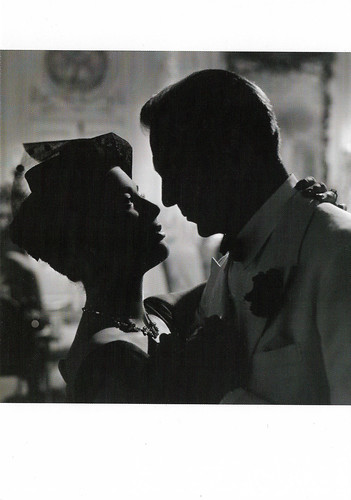
French postcard for the exhibition 'Figures de Facteur' (2004-2005) in Paris by Cartapub / Ministerie de la Culture et de la Communication. Photo: Raymond Voinquel. Gary Cooper and Lise Bourdin in Love in the Afternoon (Billy Wilder, 1956).
Image may be NSFW.
Clik here to view.

Dutch freecard by Boomerang, Amsterdam. Photo: Filmmuseum. Marilyn Monroe in Some Like It Hot (Billy Wilder, 1959). Caption: Filmmuseum Classics Tour 2002: Some Like It Hot and 26 other unforgettable classics.
Image may be NSFW.
Clik here to view.
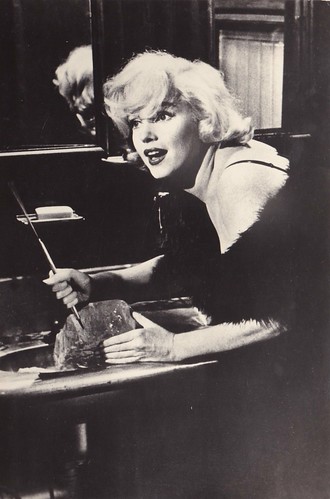
Czech postcard by Pressfoto, Praha (Prague). Photo: Marilyn Monroe in Some Like it Hot (Billy Wilder, 1959). Collection: Carla Bosch.
Image may be NSFW.
Clik here to view.

Czech postcard by Pressfoto, Praha (Prague). Photo: Jack Lemmon and Joe E. Brown in Some Like it Hot (Billy Wilder, 1959). Collection: Carla Bosch.
Image may be NSFW.
Clik here to view.
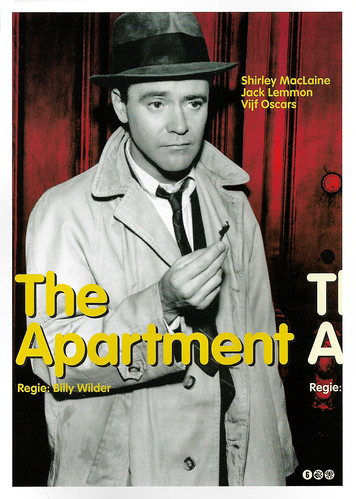
Dutch postcard by Filmmuseum, Amsterdam. Photo: Filmmuseum. Jack Lemmon in The Apartment (Billy Wilder, 1960).
Image may be NSFW.
Clik here to view.

Big East-German card by VEB Progress Film-Vertrieb, Berlin, no. 65/72,1972. Jack Lemmon and Judi West in The Fortune Cookie (Billy Wilder, 1966).
Sources: Michael Brooke (IMDb), Wikipedia (Dutch and German) and IMDb.